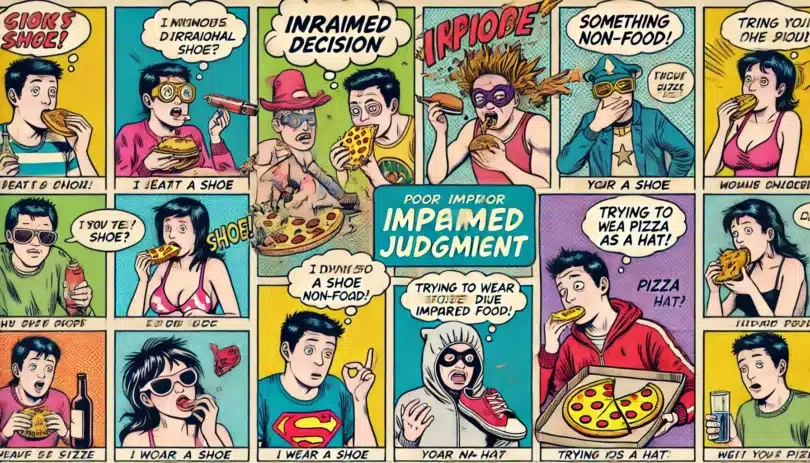Drug addiction and substance abuse can severely alter behavior and decision-making, leading to extreme actions, including unconventional or abnormal dietary choices. While eating dogs and cats (or other pets) is largely driven by cultural practices in some regions, substance abuse can compound impaired judgment, pushing individuals to engage in reckless or dangerous behaviors, including eating animals that are typically considered companions. So it is true? Can drugs lead you to eat your own pets…
How drug use can lead to unusual dietary choices, such as eating your own pets
Trump was not completely wrong, when he claimed that some people are eating dogs and cats. While drugs does not inherently lead to eat your pets, such as your beloved dog or admired cat, certain substances can impair decision-making, blur the lines between acceptable and dangerous behaviors, and, in some extreme cases, contribute to desperate actions. People living in extreme poverty or isolation may combine substance abuse with dire circumstances, resulting in the consumption of unusual or non-traditional foods, including pets.
Methamphetamine (Meth)
Methamphetamine is a potent stimulant that significantly affects the brain, leading to impulsive, erratic behavior. Chronic users often suffer from severe malnutrition and mental health issues, making them more prone to engage in desperate and dangerous actions.
- Impact on Decision-Making: Methamphetamine use leads to paranoia, hallucinations, and impaired cognitive function. This can blur users’ perceptions of what is safe or appropriate to eat. In areas where food insecurity exists, meth users may resort to extreme measures, including eating animals like stray dogs and cats.
- Behavioral Consequences: Meth users often exhibit extreme behavior due to heightened aggression, confusion, and mental instability. Combined with hunger and malnutrition, these factors can drive individuals to desperate dietary choices that deviate significantly from cultural norms.
Heroin
Heroin, a powerful opioid, depresses the central nervous system, impairing judgment and leading to severe physical deterioration. Long-term heroin addiction is often accompanied by homelessness, isolation, and malnutrition, pushing users toward unconventional means of survival.
- Socio-Economic Impact: Chronic heroin use often results in extreme poverty and social isolation. Addicts may find themselves with limited access to regular food sources, prompting them to eat non-traditional or even dangerous items, including animals that would not typically be consumed in normal circumstances.
- Mental and Physical Effects: Heroin depresses appetite and motivation, leading users into cycles of malnutrition. This desperation can sometimes lead to behaviors that involve consuming animals not traditionally viewed as food sources, including pets.
Alcohol Abuse
Long-term alcohol abuse severely impacts cognitive function, leading individuals to make reckless decisions. While alcohol alone may not directly cause someone to eat dogs or cats, it can impair judgment and lower inhibitions to the point where individuals might engage in abnormal dietary choices.
- Impaired Judgment: Heavy alcohol use impairs a person’s awareness of health risks and acceptable behavior, particularly in areas where food insecurity is prevalent. Chronic alcoholics, especially those living in extreme deprivation, may turn to eating unconventional foods due to desperation.
Synthetic Drugs (Spice, Bath Salts)
Synthetic drugs, such as Spice or bath salts, are notorious for inducing extreme hallucinations and erratic behavior. These substances can cause severe disorientation and paranoia, leading users to harm or consume animals, including pets.
- Hallucinations and Erratic Behavior: The unpredictable effects of synthetic drugs can lead individuals to engage in highly irrational actions. Users may hallucinate, become delusional, and, in some cases, consume animals they would normally find repulsive or unfit for consumption due to the drug’s effects on their perception of reality.

The Socioeconomic Context of Substance Abuse and Extreme Behavior
In many cases, substance abuse occurs in environments of extreme poverty and deprivation, where individuals lack access to adequate food and shelter. This can create a dangerous combination: drug addiction worsens living conditions, while poor living conditions increase reliance on drugs. In these circumstances, individuals may consume non-traditional or unconventional foods, including stray animals or pets, driven by necessity rather than choice.
The association between drug use and extreme dietary behavior often stems from social factors such as homelessness, unemployment, and limited access to basic necessities. In many cases, people struggling with addiction are forced to make desperate decisions that they would not otherwise consider.
Cultural Context of Eating Dogs and Cats
It’s important to distinguish between drug-fueled behavior and cultural practices. In some regions of the world, particularly in parts of Asia and Africa, eating dogs and cats has cultural roots and is considered a traditional practice. These cultural norms are not connected to drug use but rather to historical food practices and resource availability.
However, in societies where dogs and cats are viewed as pets and companions, their consumption is seen as taboo. In these cases, individuals who resort to eating pets may be driven by desperation, addiction, or extreme mental health crisis.
Will Drugs Make You Eat Your Pets – Conclusion
While drugs does not inherently lead to eat pets, such as dogs and cats, substance abuse can impair judgment, drive desperation, and lead to dangerous or unusual behavior. Methamphetamine, heroin, alcohol, and synthetic drugs all have profound effects on cognitive function, pushing individuals to engage in extreme dietary choices, including consuming animals that are typically not viewed as food.
Addressing the root causes of substance abuse, such as poverty, mental health issues, and food insecurity, is crucial to preventing these extreme behaviors. Improved access to addiction treatment, healthcare, and social support services can help mitigate the impact of drug use on decision-making, reducing the likelihood of desperate actions like consuming pets.
References:
- National Institute on Drug Abuse. “Methamphetamine DrugFacts.”
- National Institute on Drug Abuse. “Heroin DrugFacts.”
- CDC. “The Health Effects of Synthetic Cannabinoids.”
- Mayo Clinic. “Alcohol Use Disorder.“
*** Disclaimer: this article was written by AI and might not be completely accurate. However, when we compare it to trump’s statement…







